The Globally and Locally-sustainable food-water-energy innovation in Urban Living Labs (GLOCULL) project is a Belmont Forum funded international team of researchers and stakeholders aiming to develop an Urban Living Lab approach for innovations in the Food-Water-Energy (FWE) nexus that are locally and globally sustainable. The research consortium consists of Urban Living Labs (ULLs) introduced by researchers from seven universities across the globe (USA, Brazil, South Africa, Germany, Austria, Netherlands and Sweden). START is supporting Stellenbosch University, Centre for Complex Systems in Transition involvement in the Belmont Collaborative Research Action.
GLOCULL takes a cross-case approach to find local solutions to global sustainability problems through the explicit application of transdisciplinary research (TDR) and urban experimentation in ULLs. The overall aim of the research consortium is to develop a common theoretical framework, a participatory toolkit and tentative evaluative scheme for TDR projects through integration of co-created knowledge in the seven ULLs.
The GLOCULL project forms part of the growing endeavour of researchers and academics to accommodate the demands of sustainability science to develop methodological frameworks that address problems in the real world while producing scientifically relevant knowledge. Inter- and transdisciplinary research emerged as a response to the growing recognition that complex sustainability challenges cannot be addressed from the lens of a single discipline (Brandt et al., 2013). TDR not only presents sustainability researchers with a methodology for bringing different disciplines together, but to integrate the knowledge of actors from government, civil society, private sector and affected community members that fall beyond the scope academia (Brandt et al., 2013; van Breda & Swilling, 2019).
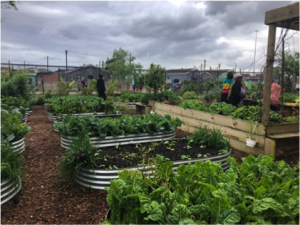
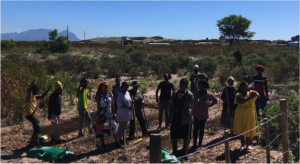
TDR therefore emerged as a means to engage society in the production of knowledge relevant to specific sustainability challenges. It is increasingly upheld as the “gold standard” of collaborative research for socially-robust knowledge (Klenk & Meehan, 2017). TDR is not a new science, per se, but a new problem centred and solution orientated methodology for doing science with society(Chilisa, 2017). Moreover, it does not only seek to understand and explain specific problems, but to actively contribute to addressing them. The field of TDR is growing rapidly across the world and is increasingly recognised for its role in advancing the transformational potential of research in society (Jahn, 2008).
Real world examples and case studies of the application of TDR in South Africa and other parts of Africa are however still very limited. A particularly relevant challenge for implementing TDR projects in Africa lies in effectively engaging society in the production for “transformative knowledge”. As the notion of transdisciplinarity has found its way into research and scholarship on the African continent, it is increasingly recognised that methods and models of TDR developed in the global North cannot merely be replicated in recourse constrained and heterogeneous contexts of the global South (van Breda & Swilling, 2019; Chilisa, 2017).
The emerging field of TDR in Africa is presents the growing number of pracademics (people working at the interface of academia and practice) with a means to challenge existing norms and grapple with urgent questions around decolonisation, social justice and social-ecological sustainability across a wide range of sectors, fields and areas of practice.
The messier questions relating to power, positionality and the roles of researchers in transformative TDR projects in many African contexts demand researchers to develop context specific methodologies as opposed to using methods and models developed in vastly disparate contexts. In other words, the collaborative dynamics that enable and constrain the implementation of TDR are highly context dependent. Across many African contexts, for example, TDR projects require researchers to embrace informality and uncertainty and engage with individuals that are directly impacted to the problems the research aims to address. Problem situations and dynamics relating to positionality differ greatly from context to context in heterogenous and messy environments of the global South. This is particularly the case in contexts such as South Africa where researchers and ‘researchees’ often come from different socio-economic and cultural backgrounds because of deeply rooted and systemic inequalities.
As part of the GLOCULL (Globally and Locally sustainable food-water-energy innovation in Urban Living Labs) project, three early-career sustainability researchers from Stellenbosch University and a group of food and sustainability activists from Khayelitsha (Cape Town) came together to put TD to the test in a real world urban laboratory setting. With the generous support of START, the transdisciplinary research team established an ULL to co-produce context specific solutions to urban sustainability challenges in the township setting of Khayelitsha.
ULLs are curated spaces for explicitly advancing urban sustainability objectives through real-world urban experimentation (Bulkeley,. et al , 2016). The aim of the ULL to experiment with solutions to sustainability challenges within a specific setting and to test the efficacy of TDR in this specific research environment.
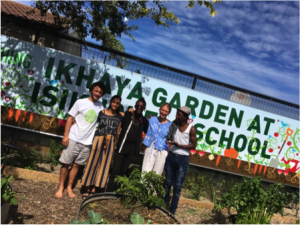
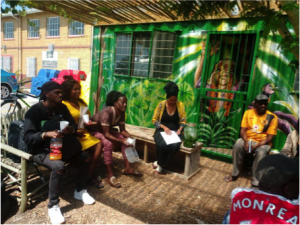
Cities across South Africa are faced by a plethora of complex sustainability challenges. Current rates of urbanisation are worsening levels of socio-economic inequalities that have been left behind by the apartheid regime. Rural inhabitants are migrating to urban areas such as Cape Town in search of economic opportunities at increasing rates. This has led to growing informal settlements, ever worsening levels of unemployment and the fortification of poverty related issues such as food insecurity and crime. Current attempts at addressing these urban sustainability challenges have failed to grasp the complex nature of the challenges and achieve effective civic participation (Ngxiza, 2012). The urban poor have perpetually been viewed as mere beneficiaries of developmental attempts and have historically been excluded from design and implementation. Growing bodies of literature suggest that these challenges require integrated approaches that explicitly include individuals that are exposed to the challenges in the design of solutions. It is suggested that TDR design could present developmental stakeholders with an approach that can achieve long-term, integrated and sustainable solutions that are needed.
Khayelitsha is the largest township in Cape Town and is characterised by severe poverty and unemployment. More than half the population of Khayelitsha live in informal settlements, with that number expected to grow as a result of rapid urbanisation rates and sluggish economic growth. The ULL was established with the aim of addressing food insecurity challenges and to contribute to the empowerment of local entrepreneurs. Many of the research collaborators of the ULL were active social entrepreneurs that joined the collaborative network at different parts of the research process. The ULL allowed them to build useful networks that have stood the test of time.
Following the recommendations of authors such as Chilisa (2017), Klenk and Meehan (2017), Van Breda and Swilling (2019), the ULL was established using a reflexive and emergent TDR methodology. In other words, the researchers refrained from entering the field with pre-conceived notions of the problem situation and approaches for addressing it. This was done by prioritising building relationships, following an emergent and reflexive design approach and by supporting the initiatives of research collaborators as opposed to imposing ideas derived from outside the context. The transition experiments were co-produced in collaboration with community stakeholders (research collaborators) from within the context and as the process unfolded. The ULL was established with the methodological aim to produce methodological insights about TDR relevant to the context.
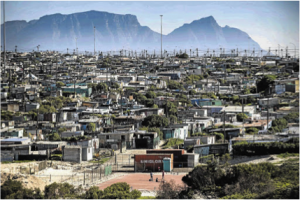
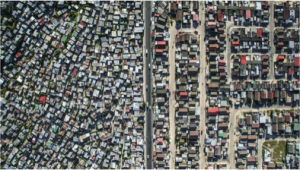
The ULL implemented and supported a variety of interventions that aimed to build capacities of local entrepreneurs and advance sustainable urban food production and consumption. This aim was pursued through the establishment of a market for local entrepreneurs and food growers, the establishment variety of urban agriculture projects as well as the implementation of capacity building workshops. The activities of the ULL led to many different insights relevant to local food systems challenges and entrepreneurship that will be outlined and discussed in detail dissemination outputs to follow. Methodologically speaking, however, the effective implementation of the ideals TDR was hindered by some underlying social and inter-personal dynamics. These include, but are not limited to, skewed power relations, communication disparities and some ethical considerations (Bosworth & Drimie, 2020).
It is, however, important to note that dynamics of this nature are extremely important to acknowledge and could play a fundamental role in guiding future early-career researchers when navigating complex and tricky research environments (Klenk & Meehan, 2017). It was found that the TDR literature generally overlooks the importance of “soft skills” and the more risky questions of relating to the lived experiences of researchers and research stakeholders. In this project the researchers became aware of the fact that a more reflexive approach is appropriate for TDR in contexts such as this. It became apparent to the researchers that a practice-based and decolonial approach to TDR is crucial for ensuring relevance of co-produced knowledge in historically disadvantaged settings such as Khayelitsha.
It thus is important for transdisciplinary researchers to embrace complexity and address potential power imbalances that might arise. It is suggested that the avoidance of difficult conversations and potential conflict will limit the prospects of revealing what is really matters to research stakeholders. In contexts where power inequalities are prevalent, these challenges become exuberated. A reflexive approach is upheld as a necessary approach to overcome challenges associated with the implementation of TDR, particularly in contextually heterogeneous environments.
Reflexivity requires researchers to be aware of and question their our own attitudes, thought processes, values, assumptions, prejudices and habitual actions(Knickel et al., 2019). It leads to an awareness of the limits of our knowledge and of how our own behaviour might disregard different views. Part of the learning and reflexivity should come from being open about different socio-economic and cultural backgrounds of research stakeholders and the impacts that could have on power relations and the direction of the research process. This kind of approach requires researchers to continually evaluate and adapt their own perspectives as continual learning takes place. Reflexivity enhances the capacity of researchers to facilitate the process of knowledge integration and democratic participation in co-production.
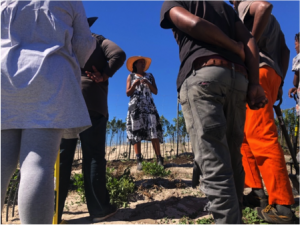
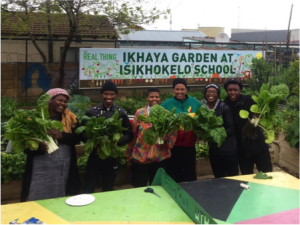
The insights presented above form part of a growing school of thought on decolonising research methodologies and grappling with personal, political and practical dimensions of transdisciplinary research. The South African ULL contributed to the greater GLOCULL project by highlighting some of the practice-based and relational dynamics of conducting TDR, and including these dynamics in an evaluative scheme. They presented the GLOCULL research partners with an approach to TDR that is embedded within and emerged from a specific real world setting as opposed to being imposed thereon. The researchers from Stellenbosch University are currently co-authoring a book chapter for a book published by Africa Research and Impact Network (ARIN) on decolonising research methodologies for social change. This book aims to unravel some of the epistemological assumptions that inform research and to contribute to the development of methodologies embedded in African philosophies and worldviews. The researchers are also participating in the International Transdisciplinary (ITD) conference and facilitating a presentation on Power, positionality and the role of early career researchers in a Transdisciplinary research in South Africa. We hope to continue playing a role in the emerging field of TDR in Africa by constantly building bridges between science and society.
Author: Ivan Pauw
References
Bosworth, A. & Drimie, S. 2020. Autoethnography for critical reflexivity and learning : building a practice-based approach to transformative transdisciplinary research in South Africa.
Brandt, P., Ernst, A., Gralla, F., Luederitz, C., Lang, D.J., Newig, J., Reinert, F., Abson, D.J., et al. 2013. A review of transdisciplinary research in sustainability science. Ecological Economics. 92:1–15.
van Breda, J. & Swilling, M. 2019. The guiding logics and principles for designing emergent transdisciplinary research processes: learning experiences and reflections from a transdisciplinary urban case study in Enkanini informal settlement, South Africa. Sustainability Science. 14(3):823–841.
Bulkeley, H., Coenen, L., Frantzeskaki, N., Hartmann, C., Kronsell, A., Mai, L., Marvin, S., McCormick, K., et al. 2016. Urban living labs: governing urban sustainability transitions. Current Opinion in Environmental Sustainability. 22:13–17.
Chilisa, B. 2017. Decolonising transdisciplinary research approaches: an African perspective for enhancing knowledge integration in sustainability science. Sustainability Science. 12(5):813–827.
Jahn, T. 2008. Transdisciplinarity in the Practice of Research (English translation of German paper). Transdisziplinäre Forschung. 37:21–37.
Klenk, N.L. & Meehan, K. 2017. Transdisciplinary sustainability research beyond engagement models: Toward adventures in relevance. Environmental Science and Policy. 78:27–35.
Knickel, M., Knickel, K., Galli, F., Maye, D. & Wiskerke, J.S.C. 2019. Towards a reflexive framework for fostering co-learning and improvement of transdisciplinary collaboration. Sustainability (Switzerland). 11(23).
Ngxiza, S. 2012. Sustainable Economic Development in Previously Deprived Localities: The Case of Khayelitsha in Cape Town. Urban Forum. 23(2):181–195.


